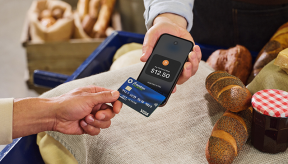6 boxes to check when searching for a payment gateway
Behold the payment gateway, your entry point to card-not-present payment processing. Presented by Chase Payment Solutions℠.

The share of e-commerce sales is expected to grow by almost 30% in the U.S. retail industry from 2023 to 2027, and streamlined digital transactions will continue to be an increasingly important part of doing business. So, how do you accept payments when your customer or their card isn’t physically in your place of business?
That’s where the payment gateway comes in.
The magic is in the name
The term “gateway” means entryway or access point. A payment gateway enables businesses to safely accept payments, including card-not-present transactions. Once the card data is entered, the gateway immediately encrypts the information and then transports it to the processing company for verification.
In today’s digital environment, a payment gateway offers many features that enable you to accept payments quickly, easily and securely at any time, from anywhere, including:
E-commerce integration — Payment gateways for online store checkouts use an application programming interface or API. These payment APIs allow your business website to communicate with a payment processing network. You can integrate a payment gateway to accept payments on your existing e-commerce website or choose a payment gateway service separate from your current platform.
Virtual terminal — A virtual terminal is a way to accept payments without a traditional point-of-sale system, card reader or payment-specific hardware. When you type a customer’s credit card or eCheck information into a secure site on your computer, tablet or phone as a form of payment, you are using a virtual terminal. Because it’s cloud-based, you can accept payments anywhere you have a connection.
Single API — Whether you have an e-commerce shop that accepts online payments or you accept payments over the phone, many payment gateways offer a single API that can be integrated across any sales channel to direct all your proceeds into one account.
Seamless processing integration — Some payment processors integrate directly with payment gateways. With this all-in-one solution, you can accept virtual payments right away via phone or your e-commerce site. You can even set up recurring billing and ACH payments.
Not all payment gateways are the same
Payment gateways make it easy for customers to pay you. While the process may appear simple, a lot goes on behind the scenes. Payment gateways offer a variety of features. Regardless of the size or type of your business, there are six things to prioritize as you research the one that’s right for you.
Data security and PCI compliance
Security is a top priority when choosing a payment processing gateway. To protect your business and your customers’ data, verify your gateway complies with strict security standards developed by the Payment Card Industry Security Standards Council (PCI SSC). Data encryption is the most common method processing gateways use to keep transactions safe during the payment process. Once submitted, credit card information is sent to the processor as a one-time-use code, making the data harder to compromise.Cost
Several different costs are associated with payment gateways, including setup, monthly and per-transaction processing fees. When examining these fees, it’s important to look at the whole picture and consider total costs. Making the right decision will depend on sales information, such as your average processing volume. Running the numbers can help you save money.Setup fee: This one-time fee covers the initial gateway setup. The cost can vary depending on the gateway you choose, the nature of your business and any equipment integrations. Some providers may waive the fee altogether.
Monthly fee: Some payment gateways charge a monthly fee for services.
Processing fee: Depending on your payment processor, this per-transaction fee may vary. For instance, let’s say it’s a flat pricing rate of 2.90% plus 25 cents per transaction and the transaction amount is $100. You would pay $3.15. In addition to flat pricing, some merchant services may offer a custom rate, such as an interchange-price rate.
Hosted vs. non-hosted
Deciding between hosted and non-hosted is one of the bigger decisions you’ll make when looking at payment gateways. Choosing the gateway service that’s the most advantageous for your business will depend on how hands-on you want to be with overseeing and maintaining your payment gateway and how much control you’re willing to give up.Hosted gateway: Also called a third-party gateway, this option redirects customers to a third-party site hosted by the payment service provider to securely enter their payment information. It then returns customers to your site to complete the checkout process.
Non-hosted gateway: Also known as an integrated payment gateway, this solution offers the advantage of customizing the checkout process with the support of a developer and an advanced infrastructure. It lets customers purchase directly on your website, providing a seamless and uninterrupted shopping experience. This approach places the responsibility of securing payment data on the merchant and opens up opportunities for implementing additional security measures. Although this is a substantial undertaking, particularly for small merchants without in-house resources, it empowers you with control over the checkout process and the user experience.
Card acceptance
Accepting a variety of credit and debit cards widens your customer base. Some payment gateways accept more cards than others, so it’s important to know your customers. If they mainly use one of the big four cards — Visa, Mastercard, American Express or Discover — then most gateways should accept them. If they are likely to use a debit card, a lesser-known credit card or a digital wallet on their mobile device, you’ll want to be sure your gateway accepts them so you don’t lose a sale.Transaction limits
Some payment gateways cap transaction amounts, limiting how much you can process each month. If your business deals with expensive goods or processes a high volume of transactions, you should be aware of these limits.International currency
The marketplace is global, which means your customers could be anywhere in the world. Depending on where your customer base is located, you may need to choose a gateway that accepts international payments. Some gateways charge fees for international transactions. If you handle international orders, it’s wise to check for any extra costs you may incur.
Get started with a payment gateway
For more information on payment gateways and other payment solutions to help grow your business, speak with a Chase Payments Advisor.



